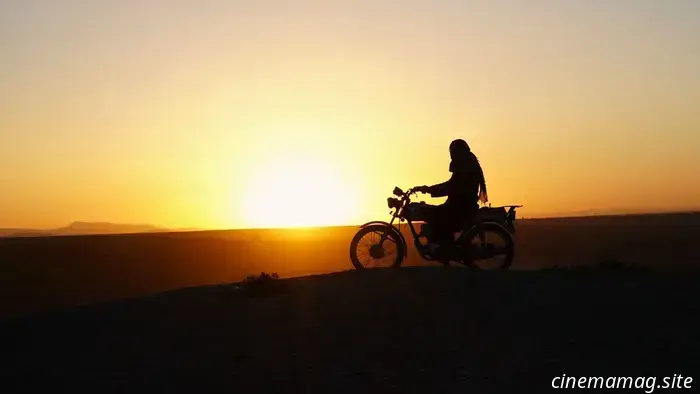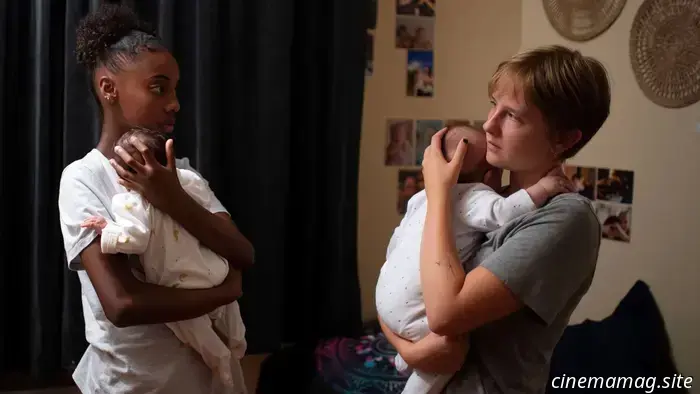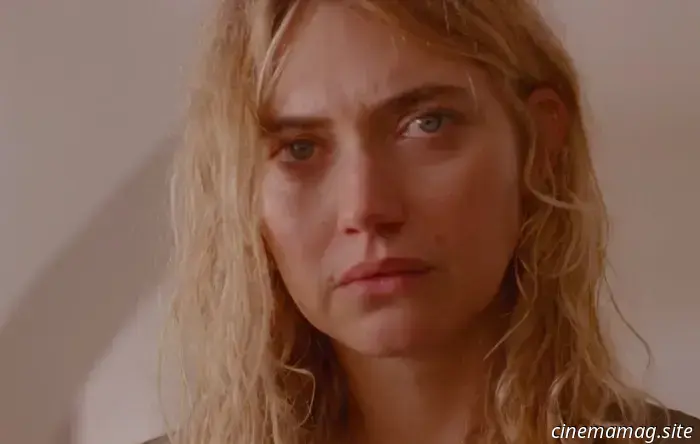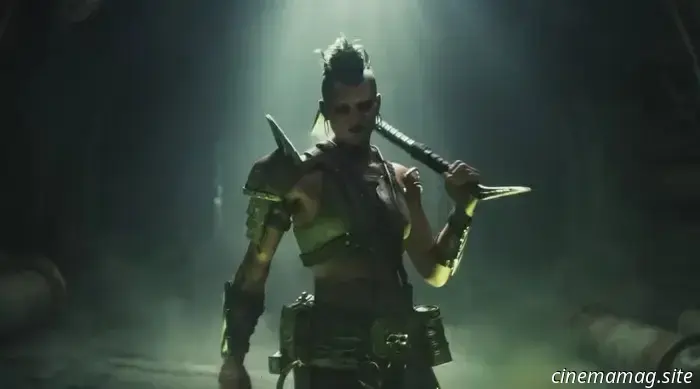
Cutting Through Rocks Review: A Confirmation of the Moral Universe's Inclination Towards Justice
The documentary *Cutting Through Rocks* exemplifies the saying, “two steps forward, one step back.” Directed by Sara Khaki and Mohammadreza Eyni, the film narrates the journey of Sara Shahverdi, the first elected councilwoman from her village in northwestern Iran. It chronicles her campaign efforts, her unexpected victory, and her challenges in enacting change within her community. A longstanding culture of male dominance presents significant obstacles, culminating in intense tensions and conflict, including opposition from her own family, as they question her determination and readiness to stand her ground.
The film presents a well-structured narrative, skillfully edited, and centered around two trees that Shahverdi planted with her late father years ago. He instilled in her the value of independence, embodying progressive ideals in a patriarchal society. As she seeks comfort in these trees, the film mirrors this sentiment. With each challenge she faces on the council, the solace found by the trees becomes increasingly significant, showcasing some of the film’s most impactful visuals.
Shahverdi emerges as a remarkable protagonist. As a former midwife and divorcee in a region where divorce is heavily stigmatized, she defies conventions by riding a motorcycle, dressing freely, and challenging authority at every opportunity. A particularly striking scene features Shahverdi asserting herself to her brothers about amending a document regarding their family inheritance to ensure that she and her sisters are not denied their rights.
Throughout the film, she faces confrontations from agitated male villagers who directly question her independence and steadfastness. There are also disturbing moments depicting young women who are assaulted by older men who are supposed to protect them. The camera often remains concealed or obscured, capturing these events discreetly.
Regardless of the numerous hurdles, *Cutting Through Rocks*, much like its central figure, demonstrates resilience. The film ultimately consists of a series of impactful, poignant moments: Shahverdi offering refuge to a young girl being pressured into a second arranged marriage; teaching a group of young women to ride motorcycles, much to the dismay of the village; and advocating for a specific design for a new village park despite opposition from fellow council members. As political forces increasingly obstruct her efforts, she remains steadfast in her convictions. Her identity as a woman, as well as her actions at home, face scrutiny. At one point, a villager’s explanation reflects a harsh acceptance of tradition: “It is what it is.”
Khaki and Eyni risked everything to film these moments. The production spanned over seven years with numerous visits, and their commitment is evident. The documentary lacks any unnecessary filler. Often, documentaries include b-roll as transitions, which can be beneficial but frequently feels superfluous. However, *Cutting Through Rocks* avoids this, delivering focused storytelling that highlights its subject with a wealth of engaging footage that emphasizes both the tragic elements and the glimmers of hope seen in the young women inspired by Shahverdi. The phrase “representation matters” has become somewhat of a joke in certain online circles, which is unfortunate, because representation truly does matter.
*Cutting Through Rocks* is set to premiere on Friday, November 21, at NYC’s Film Forum.

Other articles
 U.S. Trailer Released for Dardennes’ Cannes Award-Winning Film Young Mothers, Set to Premiere in January
Making a return to the Cannes Film Festival this year, where they were awarded the Best Screenplay accolade, Jean-Pierre and Luc Dardenne's poignant drama Young Mothers has been chosen as Belgium's entry for the Oscars. With a release from Music Box Films set for January 9, the new trailer has just been released. Here’s the synopsis: "In a shelter located in Liège, Belgium, a
U.S. Trailer Released for Dardennes’ Cannes Award-Winning Film Young Mothers, Set to Premiere in January
Making a return to the Cannes Film Festival this year, where they were awarded the Best Screenplay accolade, Jean-Pierre and Luc Dardenne's poignant drama Young Mothers has been chosen as Belgium's entry for the Oscars. With a release from Music Box Films set for January 9, the new trailer has just been released. Here’s the synopsis: "In a shelter located in Liège, Belgium, a
 5 Top Websites to Purchase Google Reviews Online in the USA 2025 - Reliable and Secure Platforms - MovieMaker Magazine
In today's fiercely competitive business landscape, maintaining a strong online presence has become essential. Often, your reputation on Google plays a crucial role in determining
5 Top Websites to Purchase Google Reviews Online in the USA 2025 - Reliable and Secure Platforms - MovieMaker Magazine
In today's fiercely competitive business landscape, maintaining a strong online presence has become essential. Often, your reputation on Google plays a crucial role in determining
 The Chronology of Water Trailer: Kristen Stewart Makes Her Directorial Debut This Winter
Following her collaborations with Olivier Assayas, David Fincher, Kelly Reichardt, David Cronenberg, and others, Kristen Stewart has made a strikingly impressive directorial debut this year with The Chronology of Water. This fragmented depiction of a life, inspired by Lidia Yuknavitch's memoir, features a cast that includes Imogen Poots, Thora Birch, Susannah Flood, and Tom Sturridge.
The Chronology of Water Trailer: Kristen Stewart Makes Her Directorial Debut This Winter
Following her collaborations with Olivier Assayas, David Fincher, Kelly Reichardt, David Cronenberg, and others, Kristen Stewart has made a strikingly impressive directorial debut this year with The Chronology of Water. This fragmented depiction of a life, inspired by Lidia Yuknavitch's memoir, features a cast that includes Imogen Poots, Thora Birch, Susannah Flood, and Tom Sturridge.
 Quick Payout Casinos in Canada | Instant Withdrawal No KYC Casinos for Canadian Players in 2025 - MovieMaker
Mirax stands out in Canadian fast payout casinos with rapid processing: Cryptocurrency options (Bitcoin, Tether) are completed in 5-30 minutes, whereas Interac and MuchBetter take 1-2 hours for transactions. Fiat.
Quick Payout Casinos in Canada | Instant Withdrawal No KYC Casinos for Canadian Players in 2025 - MovieMaker
Mirax stands out in Canadian fast payout casinos with rapid processing: Cryptocurrency options (Bitcoin, Tether) are completed in 5-30 minutes, whereas Interac and MuchBetter take 1-2 hours for transactions. Fiat.
 Warhammer 40,000: Darktide announces its upcoming character class.
Fatshark has announced the upcoming class for Warhammer 40,000: Darktide, which emerges forcefully from the depths of the Hive. The Hive Scum class will be available on all platforms starting December 2nd...
Warhammer 40,000: Darktide announces its upcoming character class.
Fatshark has announced the upcoming class for Warhammer 40,000: Darktide, which emerges forcefully from the depths of the Hive. The Hive Scum class will be available on all platforms starting December 2nd...
Cutting Through Rocks Review: A Confirmation of the Moral Universe's Inclination Towards Justice
The documentary Cutting Through Rocks exemplifies the saying, "two steps forward, one step back." Directed by Sara Khaki and Mohammadreza Eyni, the film narrates the journey of Sara Shahverdi, the first elected councilwoman in her village in northwestern Iran. We follow her as she campaigns for votes, experiences an unexpected victory, and then
